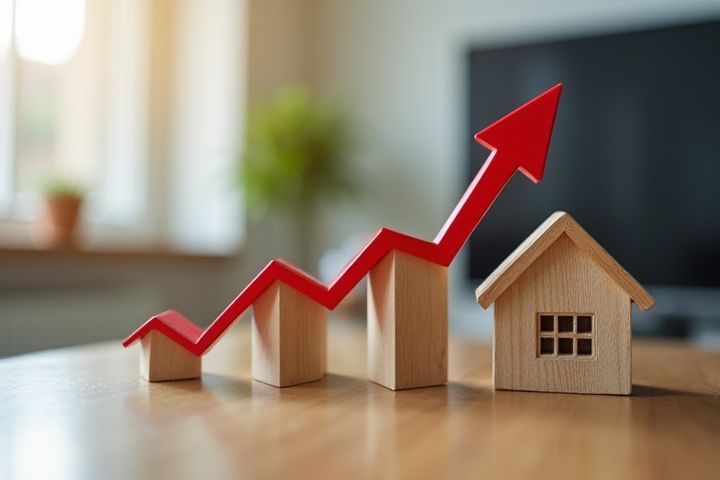
A house value can decrease suddenly due to various factors such as economic downturns, changes in the local real estate market, or significant neighborhood crime increases. Natural disasters, like floods or earthquakes, can also severely impact property values by causing physical damage or altering the desirability of the location. If a high-profile company closes nearby or there's a sudden increase in inventory, it may lead to a decrease in demand and affect your home's market value. Additionally, fluctuations in mortgage interest rates can make home buying less affordable, thereby reducing the pool of potential buyers. Ensuring your property is well-maintained and understanding market trends will help mitigate potential declines in value.
Can A House Value Decrease Suddenly
Economic recession
A house value can decrease suddenly during an economic recession due to various factors such as increased unemployment rates, reduced consumer confidence, and tighter credit conditions. These economic downturns often lead to lower demand for housing, causing property prices to plummet. In addition, many homeowners may find themselves in distress, leading to a rise in foreclosures that further drive down market prices. For you, this could mean a significant loss in home equity if the recession persists.
Natural disasters
Natural disasters such as hurricanes, earthquakes, and floods can lead to a sudden decrease in house values, often by as much as 20% to 30%. Properties in areas prone to these events may experience longer recovery times and persistent depreciation due to perceived risks. For instance, homes in flood zones face increased insurance costs and stricter lending requirements, further diminishing their market appeal. In areas recently affected by a disaster, it may take several years for home values to stabilize or regain their pre-disaster valuations.
Local crime increase
Local crime rates significantly impact house values, with studies indicating that a 10% rise in crime can lead to a reduction of up to 2% in property values. When neighborhoods experience increased criminal activity, potential buyers often perceive a higher risk, resulting in fewer offers and lower bids on homes. A surge in crime can also trigger heightened insurance premiums, further discouraging potential buyers. As crime increases, properties may linger on the market longer, exacerbating the decline in their overall value.
Property tax changes
A sudden decrease in house value can often be linked to changes in property tax assessments. When local governments adjust property taxes due to shifts in the housing market or changes in budgetary needs, homeowners may find their properties reassessed at lower values. This reassessment can directly impact your home's market value, as potential buyers may factor in higher taxes and their implications on long-term affordability. Staying informed about local tax policy changes can help you mitigate any negative financial effects related to your property's valuation.
Zoning or regulation shifts
A house value can decrease suddenly due to zoning or regulatory shifts, particularly when local authorities implement new land use policies that restrict development or change the classification of the area. For instance, if a neighborhood is rezoned from residential to industrial, property values may plummet, resulting in a loss of equity for homeowners. Furthermore, increased regulatory requirements, such as stricter building codes or environmental regulations, can deter potential buyers, leading to a surplus of unsold homes and further depreciation. It's crucial to stay informed about zoning changes in your area, as they can significantly impact your property's market value.
Nearby foreclosure spikes
Nearby foreclosure spikes can significantly affect your home's value, leading to a rapid decrease in market prices. When a surge in foreclosures occurs in your neighborhood, it creates an oversupply of homes on the market, which typically drives down property values. This situation can also create a stigma around the area, making potential buyers hesitant to invest. Being aware of local economic trends and foreclosure activity is crucial for homeowners to protect their investment.
Interest rate hikes
A sudden decrease in house value can occur, particularly in response to interest rate hikes that impact mortgage affordability. For example, a 1% increase in interest rates can lead to a significant jump in monthly payments, potentially causing a 10-20% drop in homebuyer demand. Home sales data shows that in regions with the steepest rate increases, property values may decline rapidly, leading to market corrections. If you're a homeowner, understanding these dynamics is crucial as they could affect your property's market value and resale potential.
Market saturation
Market saturation occurs when the supply of homes exceeds demand in a specific area, leading to an oversaturated real estate market. In such conditions, the competition among sellers increases, resulting in downward pressure on home values. As buyers have more options, they may take advantage of lower prices, causing your property's value to decrease abruptly. Additionally, economic factors, such as rising interest rates or declining job growth, can exacerbate this situation, leading to a significant drop in housing demand.
Infrastructure issues
A house's value can drop significantly due to infrastructure issues, with research showing that properties near failing infrastructure can lose up to 20% of their market value. Problems such as deteriorating roads, inadequate drainage systems, and aging public utilities can deter potential buyers and lead to lower offers. For example, areas experiencing frequent water main breaks or prolonged construction delays may see a swift decline in home prices. You should be aware that local infrastructure evaluations and planned upgrades can be key factors in your property's long-term value.
Poor neighborhood management
A house value can decrease suddenly, particularly in areas with poor neighborhood management, which often leads to declining property conditions and reduced appeal. According to a study by the National Association of Realtors, homes in neighborhoods with inadequate maintenance and high crime rates can see up to a 20% drop in market value. Factors such as neglected public spaces, increased vacancy rates, and low community engagement significantly contribute to this decline. If you own property in such an area, addressing these issues collaboratively with neighbors can help stabilize your home's value.
